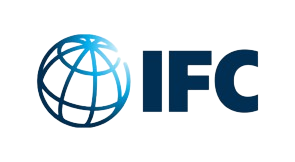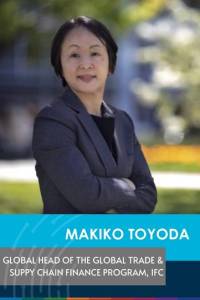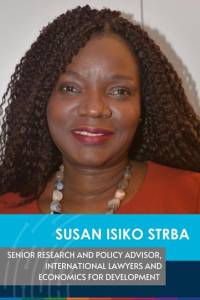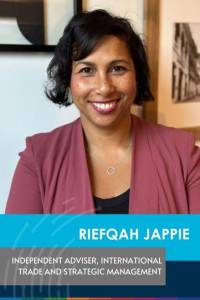Trade Policy

Content
Women in trade, treasury and payments – trade policy
Sponsored by

How has IFC ‘Embraced Equity’ both inside its workplace and across its partner countries / programmes?
Embracing equity is central for IFC both in its workplace and across its programmatic activities. IFC incorporates gender balance targets in its corporate scorecard and promotes gender equity through various internal programs. For our clients in emerging markets, we see gender as part of our core development goals.

IFC strives to create private sector markets that provide equal economic opportunities by closing gender gaps through its investments and advisory work. Over the last four years, IFC has invested nearly $7 billion of its own capital with a gender lens and mobilised an additional $4 billion. As more women enter the labor market and exert influence as consumers, savvy companies recognise the need to attract and retain more female employees and purchase from women-led companies. IFC’s Gender-Smart Business Solutions program provides clients with the tools and resources to strengthen gender inclusion within their operations, resolve labor issues, increase employee engagement, benefit from inclusive sourcing, and enhance company performance.
What are ways to get women more involved in international trade?
Access to trade finance is a major obstacle for women starting international trade businesses. As one of IFC’s development priorities, we provide strategic support where trade finance gaps are identified. In order to support more women-owned businesses that would benefit from participation in cross-border trade, IFC launched the “Banking on Women” (BOW) initiative under the Global Trade Finance Program (GTFP). Under this initiative, through GTFP’s network, we are leveraging financing tools and incentives that empower banks to increase trade finance offerings to women-owned SMEs and entrepreneurs in emerging markets, further raising awareness of the untapped potential of investing in women-owned businesses while catalysing sustainable trade finance services for women.
How can men in executive positions better support women in their career progression?
Men play a significant role in influencing workplace environments and can be champions of inclusivity and gender equality, including through advocating for more representation of women in leadership roles, and through formal or informal mentoring of women employees. Companies that invest in women’s employment gain an important competitive advantage because they reach a wider talent pool and realize enhanced productivity. Men’s commitment and collaboration to implement gender equality in the workplace are essential for companies to reach their potential. Moreover, having gender-diverse management is positively correlated with better financial and non-financial performance, contributing to overall company growth.
What does #EmbraceEquity mean to you?
Embracing equity means ‘easing access to finance for more women-owned and women-led SMEs.’ The
financing gap for women-owned SMEs in emerging markets is estimated at US$1.5 trillion. There is significant market demand for financial services for women in general. Trade finance is even more challenging. IFC recently conducted a research study in 6 countries spanning three regions and found that only 33% of women-led businesses who trade utilised trade finance from a bank. We need to
change this market environment and accelerate gender inclusion in trade finance. IFC launched the
Banking on Women initiative under the Global Trade Finance Program to expand the availability of trade
finance for women in emerging markets. #EmbraceEquity
How has the WEF “embraced equity” in its workplace?
The World Economic Forum is a partner of the Swiss-run Equal Salary Foundation and conducted a re-certification of its salary equity certification in 2019. The analysis at that time revealed small gaps in Switzerland and the US that the Forum took steps to address. The Forum’s policies support equal pay and gender equality, including its Code of Conduct, Anti-Harassment policy, and dedicated employee resource groups focused on diversity and inclusion. The human resources team is represented on the managing board, with the organisations’ gender diversity data regularly on the agenda for monitoring.

Can you give any examples of problems faced by younger women during their career progression?
In general, I can see that younger women face three types of challenges in their career progression. The first is that younger women are more likely to be dismissed for their age than younger men. Due to various system biases, men are more readily recognised as experts, giving them greater professional standing and visibility. Second, the data shows that women consistently undervalue themselves vis-à-vis peers, especially in relation to salary negotiations. Third, women may have to leave the workplace for childcare, at minimum for a short time. That can impact career advancement opportunities at critical progression moments and even hiring decisions. Since women still often bear more responsibility for household work that can also impact their ability to dedicate overtime or take on additional projects in the workplace as compared to male peers.
Do you have any personal anecdotes about senior colleagues supporting you during your career growth?
I have been fortunate to be supported by various senior colleagues during my career growth. In the early stages, I had a good line manager, who pushed for opportunities and mentored me on how to best take advantage of those. That include frank feedback on what I could do better, which was not always easy to hear, but was very formative. It was a good relationship where my responsiveness to this feedback then inspired the line manager to continue to push for opportunities. I have also on several occasions been championed as an expert by senior colleagues who have encouraged stakeholders to hear from me. My recent promotion was also strongly supported by another line manager who listened to the vision I had for my current role and has been a consistent partner in helping me to implement this vision.
What does #EmbraceEquity mean to you?
It means we work to ensure the systems we operate in provide equal opportunities and have no discriminatory outcomes based on gender. Those systems include financial, social, commercial, political and academia, among others. Embracing equity also means surfacing under-represented female voices where rising to leadership roles was more challenging due to other systemic biases. We need to have a diversity of female leaders across global systems.
Amy Morgan, Altana Technologies

What does embrace equity mean to you?
To #embraceequity means adjusting conditions to account for imbalance. It’s providing the necessary support so the overlooked, historically silenced, and disconnected have an equal opportunity to engage and succeed.
From a global trade perspective, I believe embracing equity refers to championing a fair and balanced trade system that benefits all countries and citizens. It’s reducing the advantages and disadvantages that some gender groups, ethnicities, countries, or companies have over others, making it possible for everyone to
participate in the global marketplace and access the benefits of trade that have historically been unevenly distributed and whose negative impacts have been disproportionately felt.
Embracing global trade equity requires addressing unequal access to markets, reducing trade barriers, unfair labour practices, tax avoidance, and subsidies. Addressing this was a deciding factor in coming to work with Altana, where we use AI to achieve transparency into cross-border supply chain networks, so companies can foster more inclusive behaviors, and governments can assess the impact of proposed trade policies to encourage sustainable action.
At the heart of global trade lies a curiosity for the diverse exchange of goods and ideas. Embracing equity can inspire innovation and lead to greater economic prosperity, improved living standards, and reduced poverty making the world better for all.
Petra Herrmann, EY

What does embrace equity mean to you?
Equity for me is an essential value which is the key to shift society and economy into the next stage of development. Only with appreciation of all genders’ efforts will we succeed.
Makiko Toyoda, IFC

What does embrace equity mean to you?
To embrace equity means to ‘support inclusion in company value chains.’ Now, more and more suppliers in emerging markets are involved in global supply chains, but large importers lack the gender-lens necessary to promote diversity and inclusion in their supplier network, and women-owned businesses lack the trade and supply chain finance necessary to compete. Estimates suggest that less than one percent of multinational companies’ sourcing budgets is used to buy from women-owned suppliers, who are largely invisible in global and local value chains and export markets. To address these challenges and promote gender inclusion in supply chains in emerging markets, IFC recently launched the Global Supply Chain Finance Program. #EmbraceEquity
Susan Isiko Strba, International Lawyers and Economists for Development

What does embrace equity mean to you?
Embracing equity means that first we create that equity before we embrace it. Equity means having equal and fair access to trade opportunities regardless of gender. Opportunities include access to trade information such as price of goods, labour, access to markets, taxation, sales platforms, and fora where trade-related policies are discussed and formed. Equity means looking at gendered tenets of trade, such as women’s safety in cross-border trade. Several women in economically disadvantaged communities are the financial pillars of the family. So equity means that a woman who lives deep in a village in a least developed country can access finance to expand her business, and sell whatever she produces in local and international market, in the same way as men. It also means that women, whether from rural or urban area, at national or international level, have access to trade technology, and digital upskilling for example in the use of electronic commerce.
Riefqah Jappie, Independent Adviser

What does embrace equity mean to you?
Embracing equity opens us up to new ideas, innovation, and opportunities, yet it can also be challenging, as it disrupts existing power dynamics and institutions. In my field, we see that women-led businesses account for just one in five exporters, and only 2% of venture capital funds in the US go to women founders. If we take additional factors into account, such as race and education levels, we find even further underrepresentation amongst women professionals and entrepreneurs.
To truly #EmbraceEquity and enrich our work, we need to address issues of intersectionality, recognise our positions of privilege and use them to amplify the voices of women who have often been denied access and opportunity, including indigenous and afro-descendant women.
I have been both the recipient of such support and have sought to extend it to others in my career in international trade over the past 20 years.
Let’s forge a gender equity path that recognises that we don’t all have the same starting position or face the same obstacles.
Jana Psarska, techUK

What does embrace equity mean to you?
To embrace equity, we need to create a world free of gender, racial, social bias and discrimination in all its forms. It’s about feeling included and accepted where we want to belong on the basis of our talent or personal decision rather than social background, sexual orientation or gender.
In fact, it’s not just something we write or talk about. It’s something we believe in unconditionally.
What shall we do to embrace equity? I believe we need to take concrete actions around our individual behaviour to make this happen. At the same time, we shouldn’t forget the importance of collective activism which equally matters. Through the process of equity, we stand a better chance of reaching equality.
Yashodhara Dasgupta, UK India Business Council

What does embrace equity mean to you?
Embracing equity is a two-part action – understanding that people come from different circumstances, and building structural enablers that provides everyone tools that address their specific circumstances so they can perform to their fullest potential.
It goes a step further than equality in that it is not only about providing people the same opportunity and rights but also about acknowledging different people need resources that work for them.
For instance, those with care-giving responsibilities are provided flexible policies that do not require them to choose between
attention to career vs attention to their families. This is also intrinsically linked to gender equity including proactively delinking caregiving from being a woman’s domain.
There is enough evidence to show that equity leads to better outcomes for everyone – in the context of workplaces, this means higher personal happiness, productivity and creativity leading to enhanced overall performance of the organisation.
Ultimately, embracing equity is as much about workplace and institutional policies as about individual action to review the status quo and build inclusivity into the ways we engage.
Aditi Sara Verghese, World Economic Forum

What does embrace equity mean to you?
Embracing equity begins with understanding how current systems and policies may be keeping some groups out. In a complex system like trade, there may be many factors. These include access to knowledge, networks, finance and the internet, property ownership and land rights, market access and the equitable protection of traditional knowledge, traditional cultural expressions and intellectual property rights.
Trade policies and private sector practices can play a positive role here. The communities in question must be meaningfully involved throughout the process from design to implementation and review. It’s also important to bring everyone along to avoid a backlash.
This may involve demonstrating why inclusion is a net positive for economies, societies and the environment as a whole and what the unique opportunities are in engaging traditionally marginalised groups.
Sponsors & Partners
Learn More- WITTP Over The Years
- Topics
- Podcasts
- Videos














